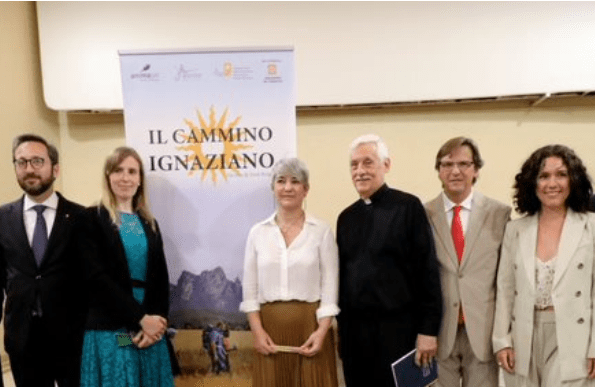In recent days, the Generalitat de Catalunya presented, first at the Vatican Filmoteca in Palazzo San Carlo and then at the Casa del Cinema in Villa Borghese, the documentary “The Ignatian Way” by Catalan director Jordi Roigé. The delegate in Italy of the Government of Catalonia, Luca Bellizzi, the director of the Ignatian Way Office, Father Josep Lluís Iriberri, a Jesuit, and the director himself spoke.
The film allows you to experience, from the perspective of a pilgrim, the visual and spiritual beauty of the journey taken by Ignazio di Loyola from Azpeitia to Manresa in 1522. This year marks the 500th anniversary of this anniversary which Manresa celebrates with a series of activities .
“Transmitting the experience of walking the Ignatian Way was our goal,” explained director Jordi Roigé. “The pilgrims, the context and the beauty of the landscape have made life easier for us, now we hope that many people will be moved by wanting to know this marvel in person”, he said.
Through the experiences of four pilgrims and a guide, the images of the documentary invite you to enjoy the architecture, monuments, landscapes, fauna and flora, gastronomy, culture and people of the spaces that make up the Ignatian Way.
On this 650 km pilgrimage, pilgrims cross the Basque Country, La Rioja, Navarra, Aragon and Catalonia, meeting and interacting with people, tasting the typical foods of the local cuisine or contemplating the monuments and the scenic beauty that surrounds them.
Mbassa Niang, Iñigo Medinilla, Iñaki Sánchez and Marta Burguet are the pilgrims of the documentary, people of different cultures, regions and religions. The leader of the group is the Jesuit Josep Lluís Iriberri, director of the Pilgrim Office of the Ignatian Way, who has been accompanying pilgrims from all over the world for years.
The documentary is produced by Animaset and has the collaboration of the Jesuits, the Generalitat de Catalunya, the Patronat de Turisme of the Diputació de Lleida, the Turisme de La Rioja and the Ajuntament de Manresa.
In his speech, Bellizzi stressed that the 500th anniversary of the
conversion of Ignatius of Loyola to Manresa is “a unique opportunity to promote the
The Ignatian Way ”and underlined his own with respect to other similar paths
“Identity and peculiar personality”, linked to both the spiritual and touristic aspects,
naturalistic, artistic, historical and gastronomic. He added that “Catalonia is
it has always been a welcoming land “and reiterated its vocation to” build bridges “
maintaining its “well-defined” identity. For this reason it has motivated the interest of the
Generalitat to promote the Ignatian Way. In conclusion, taking up a
concept expressed the day before by Father Sosa regarding the pilgrimage, ha
highlighted how the journey presented in the documentary is as external as
inner.
Josep Lluís Iriberri, director of the Pilgrim Office of the Ignatian Way, ha
affirmed that “the experience lived by Ignatius of Loyola in the sixteenth century is still valid
today in the 21st century and can be used by anyone to rediscover a different path, a
different orientation “. “This is what we will discover, an inner journey, a
external journey, landscapes and experiences ”he reiterated.
For its part, the director of the documentary Jordi Roigé, explained that it is a
“artisan” product, made “with hands and technique but also with the heart… and with i
feet!”. He added that the footage was recorded with a staff of 11,
including the four pilgrims and Father Iriberri, who led the pilgrimage, fifteen
days. “It’s a very sincere film,” she concluded. It should be noted that among the four pilgrims
there is a Senegalese girl of Muslim religion, demonstrating that the Way is
truly open to anyone.
The route starts from Azpeitia, the birthplace of Iñigo de Loyola, in the Basque Country
(Euskadi) and through La Rioja, Navarre and Aragon reaches Catalonia with the
final stages of Montserrat and Manresa.
Among the hundreds of spectators present at the screening there was also the general manager
of Religious Affairs of the Generalitat, Yvonne Griley, the cultural attaché of the embassy of
Spain in Italy, Carlos Tercero, several Jesuits and members of religious congregations,
professionals from the world of cinema and journalists.
The documentary, directed by Jordi Roigé and produced by Animaset, recalls the figure of S.
Ignazio di Loyola on the occasion of the 500th anniversary of his conversion and will be in theaters in
Spain starting July 22. It is subtitled in several languages, including Italian. At the
realization contributed by the Society of Jesus, the Generalitat of Catalonia,
the Tourist Board of the Province of Lleida, the Tourist Office of La Rioja and the Municipality of
Manresa.
In the photo: the presentation at the Vatican Film Library was attended by, among others, the Minister of Justice of the Catalan Government, Lourdes Ciuró, the Minister of Foreign Action, Victoria Alsina, the Mayor of Manresa, Marc Aloy and the superior general of the Jesuits, father Arturo Sosa who highlighted the role of the pilgrim. “We talked about the road, I want to talk about the pilgrim”, said the black Pope, explaining that the pilgrim must follow the signs and allow himself to be accompanied because “accompaniment is absolutely necessary, allowing himself to be guided, recognizing that if you let yourself be guided it is better “.

